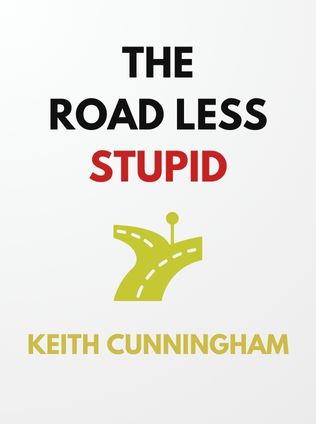
The Road Less Stupid
Advice from the Chairman of the Board
By Keith Cunningham
Published 11/2017
About the Author
Keith Cunningham is a seasoned entrepreneur, author, and speaker, whose insights have transformed the way business leaders think about success and failure. With decades of experience in the business world, Cunningham has built multiple companies, faced significant challenges, and learned from both his successes and failures. He is best known for his work as the founder of Keys to the Vault, a business school that provides practical financial education and business advice to entrepreneurs and executives. His approach is deeply pragmatic, grounded in real-world experience, and focused on the importance of avoiding costly mistakes through disciplined thinking and strategic planning.
Main Idea
The Road Less Stupid is a guide to business success through the avoidance of "stupid" mistakes. Keith Cunningham argues that the path to financial success is not necessarily about making brilliant decisions, but rather about avoiding the kind of errors that can derail a business. These mistakes often stem from pride, ego, and a lack of rigorous thinking. Cunningham presents a methodology for disciplined thinking that helps business leaders identify potential pitfalls, assess risks accurately, and make decisions that are rooted in reality rather than emotion or wishful thinking. The book is structured around common mistakes that even smart executives make, offering practical advice on how to avoid them and encouraging readers to adopt a more thoughtful and strategic approach to business.
Table of Contents
- Introduction: The Cost of Stupid Mistakes
- The Dangers of Pride and Ego
- Understanding Risk and Reward
- Persistence and Patience: The Real Path to Success
- Customer-Centric Business Strategies
- The Importance of Strategic Focus
- From Goals to Plans: Bridging the Gap
- Tracking the Right Metrics
- Building a High-Performance Culture
- The Power of Deep Thinking
The Dangers of Pride and Ego
Pride and ego are two of the most insidious factors that can derail a business, according to Cunningham. These emotions can cloud judgment, leading to overconfidence and poor decision-making. Cunningham warns that one of the most dangerous mistakes a business leader can make is to allow their ego to dictate their decisions. This is particularly perilous when past successes inflate one's confidence in future projects, leading to a disregard for potential risks.
“One humbling failure can help you view future projects more objectively because it takes humility to learn new things and assess your own ideas honestly, both of which are important for anyone directing a business,” Cunningham writes. This quote underscores the importance of humility in business—a theme that resonates throughout the book.
Even if you've experienced failure and been humbled by it, Cunningham advises that it's crucial to have someone else—someone not emotionally invested in the project—review your proposals. This second opinion can act as a check on your ego, helping to ensure that decisions are made based on sound reasoning rather than overconfidence.
More Dangers of Pride
Ryan Holiday, in his book Ego Is the Enemy, echoes Cunningham’s warnings about the dangers of ego. Holiday notes that ego can lead to a range of business missteps, from ignoring obvious problems to rushing into projects without adequate preparation. Conversely, it can also lead to inaction, as people become so caught up in their own self-importance that they lose the drive to push their ideas forward.
“Ego is the enemy of what you want and of what you have: of mastering a craft, of real creative insight, of working well with others, of building loyalty and support.” – Ryan Holiday
Pride can also blind us to risks. Cunningham challenges the common misconception that higher risks lead to higher returns. In reality, higher risks often simply equate to a lower probability of success. The key to avoiding stupid mistakes is to thoroughly assess risks by writing them down and considering their likelihood and potential impact. This disciplined approach helps in making more informed decisions that are not swayed by an inflated sense of invulnerability.
Understanding Risk and Reward
One of the core lessons in The Road Less Stupid is the importance of understanding risk in business decisions. Cunningham emphasizes that many business leaders fail to properly assess risks, leading to decisions that could have been avoided with better analysis. He advocates for a methodical approach to risk assessment, which includes writing down potential risks, estimating their likelihood and impact, and prioritizing them based on these factors.
“Higher risk just means a lower probability of success,” Cunningham asserts, challenging the widely held belief that risk and reward are directly correlated. He advises that if the consequences of a given risk are too severe or if the potential rewards do not justify the risk, it’s better to walk away from the venture. This perspective encourages business leaders to be more cautious and deliberate in their decision-making, focusing on long-term stability rather than short-term gains.
The Risk of Inaccurate Risk Assessments
Writing out risks side by side allows for a more objective comparison, but Cunningham cautions that the accuracy of these assessments is crucial. Misjudging the probability or impact of risks can lead to poor decision-making. For instance, underestimating the seriousness of a risk due to insufficient data can create a false sense of security, leading to disastrous outcomes.
Sign up for FREE and get access to 1,400+ books summaries.
You May Also Like
The Subtle Art of Not Giving a F*ck
A Counterintuitive Approach to Living a Good Life
By Mark MansonRich Dad Poor Dad
What the Rich Teach Their Kids About Money - That the Poor and Middle Class Do Not!
By Robert T. KiyosakiHow To Win Friends and Influence People
The All-Time Classic Manual Of People Skills
By Dale CarnegieQuiet: The Power of Introverts
The Power of Introverts in a World That Can't Stop Talking
By Susan Cain



















